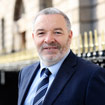RCSI is ranked in the Top 50 in the Times Higher World University 2022 for 'International Outlook'. Our global outlook is underpinned by collaborative partnerships with institutions across the world. Here, Professor Kevin McGuigan shares his perspectives on the value to his research of international and multi-disciplinary collaboration.
My research on solar water disinfection (SODIS) in low-to-medium-income-countries (LMICs) spans more than 25 years. In that time my research colleagues and I have shared important and significant research outcomes. We completed the first ever study of the effect of SODIS on the health of a human population in a paper that was published in The Lancet in 1996. Since then our studies in Africa and Asia have demonstrated that children under the age of 5 who drink water treated by SODIS experience reductions in incidence of diarrhea and dysentery ranging between 24%-50%. We also found that during a cholera epidemic in Kenya, those children who were using SODIS were seven-times less likely to contract the disease than children in the same area who drank untreated water.
The problem of providing access to safe water requires expertise in so many different areas. If we look at the science aspects, we need input from engineers, chemists, microbiologists, mathematicians, designers, and physicists. From the social science side, we rely on the cooperation of the communities experiencing the problem, so the skills of experts in behaviour change, psychology, conflict resolution, sociologists, economists, social workers, entrepreneurs, local government and NGOs, are indispensible. If you try to do it all yourself, you will fail magnificently.
The problem of access to safe water cannot be resolved without the collaboration and diverse skill-set of your project partners. The beauty of collaboration is that something that I might see as a huge challenge, is often an easily solved problem to my colleagues from other fields - collaboration allows you to look at a problem from a variety of perspectives. I feel privileged to have had the opportunity to work with colleagues with such a diverse spectrum of skills and abilities.
Miscommunications and misunderstandings
For me the biggest challenge has always been communication. In many of the countries where I work, English is not the first language. Even when all the team members have a good grasp of a common language, if we add in the complexities of differences in cultural beliefs and levels of education, the threat of miscommunication or misunderstandings is always present.
I have always relied on our local partners within the communities (charities, NGOs, etc.) to manage the communications. Within the research partners, it is always best to be completely frank right from the start. If you think something might cause a problem then this needs to be addressed straight away rather than ignoring it and hoping for the best. Researchers from different fields often use the same vocabulary but I frequently find that their meaning of a word is significantly different to mine. This is especially the case when STEM scientists collaborate with social scientists. If in doubt seek clarifications or definitions for the terms that are causing confusion.
An unexpected challenge I encountered in Malawi and Zimbabwe was having to respond to the concerns of villagers that treated water that had been left outside the house to cool overnight, might be cursed by vindictive neighbours or witches. This might sound frivolous but such cultural beliefs have to be addressed if we want the technologies to be adopted and used within the communities.
The courage to say 'I don’t know'
The smartest thing I ever did in my research career was not being afraid to say 'I don’t know the answer to that question', and then searching for someone with appropriate expertise in another field who did. The price that you have to pay for this, is accepting that frequently what you think will solve a problem is that exact opposite of what is really needed. So, if you collaborate in a large consortium consisting of disparate fields of expertise, you must be prepared to listen and learn from them.
Working in such interdisciplinary teams is an honour and a privilege that every researcher should try to experience.
Read more about Prof. McGuigan's research in Sub- Saharan Africa.

Kevin McGuigan is Professor of Medical Physics at RCSI and director of the RCSI Solar Disinfection Research Group which develops appropriate solar-based technologies for water treatment in resource-poor rural environments.
RCSI is committed to achieving a better and more sustainable future through the UN Sustainable Development Goals.
![]()
![]()
![]()
